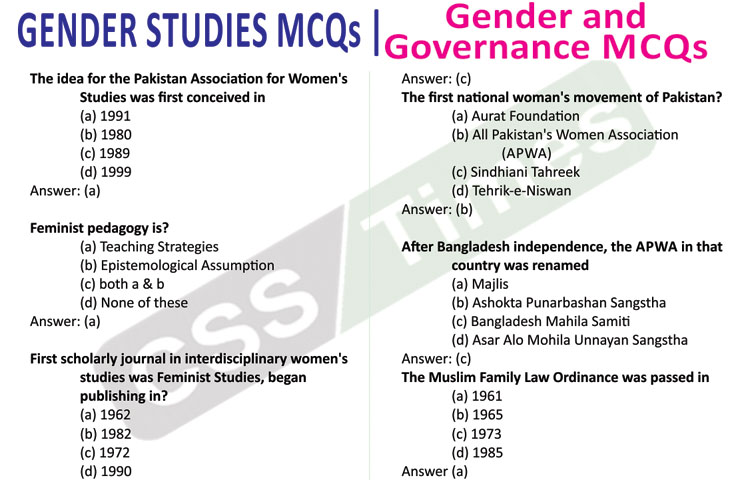The idea for the Pakistan Association for Women’s Studies was first conceived in
(a) 1991
(b) 1980
(c) 1989
(d) 1999
Answer: (a)
Explanation:
The idea for the Pakistan Association for Women’s Studies was first conceived in 1991 at the National Workshop on Women’s Studies organized: A Pakistani Perspective by the Centre of Excellence in Women’s Studies at the University of Karachi. PAWS was formed in March 1991 in Karachi by activists and academics with feminist consciousness to acts as a catalyst to bring about the empowerment of women, transforming a gender biased society into one inclusive of gender equity and social justice.
Feminist pedagogy is?
(a) Teaching Strategies
(b) Epistemological Assumption
(c) both a & b
(d) None of these
Answer: (a)
Explanation:
Feminist pedagogy is a way of thinking about teaching and learning, rather than a prescriptive method. As such, it is used in different ways and for differing purposes within and across disciplines and learning environments. Definitions of feminist pedagogy vary widely, but there is common agreement on these three key tenets:
• Resisting hierarchy: In the learning environment, the teacher figure and students work against the creation of a hierarchy of authority between teacher and student; the students also deliver ‘content’ and influence the design of the class.
• Using experience as a resource: As well as using traditional sources of information, such as academic journals and books, the students’ and teachers’ own experiences are used as ‘learning materials’. The purpose of using experience as a resource is twofold: firstly, experiences which have not been documented in academic work are brought into discussion, and secondly the class participants experience transformative learning…
• Transformative learning: Feminist pedagogy aims for the class participants (students and teachers) not just to acquire new knowledge, but for their thinking to shift in new directions. This may involve the realization that personal interpretations of experience or of social phenomena can be re-read and validated in new, critical ways
